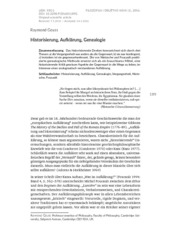Historisierung, Aufklärung, Genealogie
Апстракт
Das historisierende Denken kennzeichnet sich durch drei Thesen: a) die Vergangenheit war anders als die Gegenwart, b) sie war kontingent, c) trotzdem ist sie gegenwartsrelevant. Die von Nietzsche und Foucault praktizierte genealogische Methode erweist sich als ein brauchbares Mittel, eine historisierende Kritik gewisser Aspekte der Gegenwart in die Wege zu leiten, im Interesse einer undogmatisch verstandenen Aufklärung.
Кључне речи:
historisierung / genealogie / aufklärungИзвор:
Filozofija i društvo/Philosophy and Society, 2016, 189-202Издавач:
- Beograd : Institut za filozofiju i društvenu teoriju
Институција/група
IFDTTY - JOUR AU - Geuss, Raymond PY - 2016 UR - http://rifdt.instifdt.bg.ac.rs/123456789/390 AB - Das historisierende Denken kennzeichnet sich durch drei Thesen: a) die Vergangenheit war anders als die Gegenwart, b) sie war kontingent, c) trotzdem ist sie gegenwartsrelevant. Die von Nietzsche und Foucault praktizierte genealogische Methode erweist sich als ein brauchbares Mittel, eine historisierende Kritik gewisser Aspekte der Gegenwart in die Wege zu leiten, im Interesse einer undogmatisch verstandenen Aufklärung. PB - Beograd : Institut za filozofiju i društvenu teoriju T2 - Filozofija i društvo/Philosophy and Society T1 - Historisierung, Aufklärung, Genealogie SP - 189 EP - 202 DO - 10.2298/FID1601189G ER -
@article{
author = "Geuss, Raymond",
year = "2016",
abstract = "Das historisierende Denken kennzeichnet sich durch drei Thesen: a) die Vergangenheit war anders als die Gegenwart, b) sie war kontingent, c) trotzdem ist sie gegenwartsrelevant. Die von Nietzsche und Foucault praktizierte genealogische Methode erweist sich als ein brauchbares Mittel, eine historisierende Kritik gewisser Aspekte der Gegenwart in die Wege zu leiten, im Interesse einer undogmatisch verstandenen Aufklärung.",
publisher = "Beograd : Institut za filozofiju i društvenu teoriju",
journal = "Filozofija i društvo/Philosophy and Society",
title = "Historisierung, Aufklärung, Genealogie",
pages = "189-202",
doi = "10.2298/FID1601189G"
}
Geuss, R.. (2016). Historisierung, Aufklärung, Genealogie. in Filozofija i društvo/Philosophy and Society Beograd : Institut za filozofiju i društvenu teoriju., 189-202. https://doi.org/10.2298/FID1601189G
Geuss R. Historisierung, Aufklärung, Genealogie. in Filozofija i društvo/Philosophy and Society. 2016;:189-202. doi:10.2298/FID1601189G .
Geuss, Raymond, "Historisierung, Aufklärung, Genealogie" in Filozofija i društvo/Philosophy and Society (2016):189-202, https://doi.org/10.2298/FID1601189G . .


